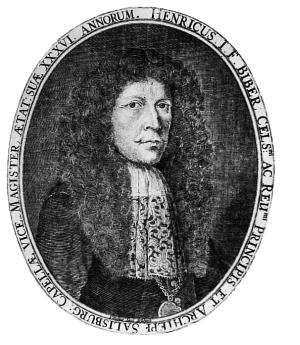

Austrian composer and violinist. Little is known of his musical training. Around 1665 he began his career as a member of the Court of Prince-Bishop Karl of Olomouc (Count Liechtenstein-Kastelkorn), at his castle in Kromeriz. In 1670 Biber left the court without permission to join the chapel forces at the Salzburg court of the Archbishop Maximilian Gandolph. IHe was promoted to Vice-Kapellmeister (possibly from choirmaster) there in 1679, and live years later he was made court Kapellmeister. Emperor Leopold I, who through the years had grown to admire Biber's music and violin playing, bestowed the title of nobility on him in 1690. Biber apparently retired to the country and spent his last years composing sacred and dramatic music for Salzburg. Of his several operas and school dramas the music for only one is extant, Chi la dura la vince (1687); his sacred works include motets, vespers, Masses, and a Requiem for five. He has been suggested as the composer of the Missa salisburgensis, formerly attributed to Benevoli. He is best known for his violin music, including the Mystery Sonatas and the Harmonia artificiosa-ariosa (Nuremberg, 1712); many of these works employ scordatura tunings.